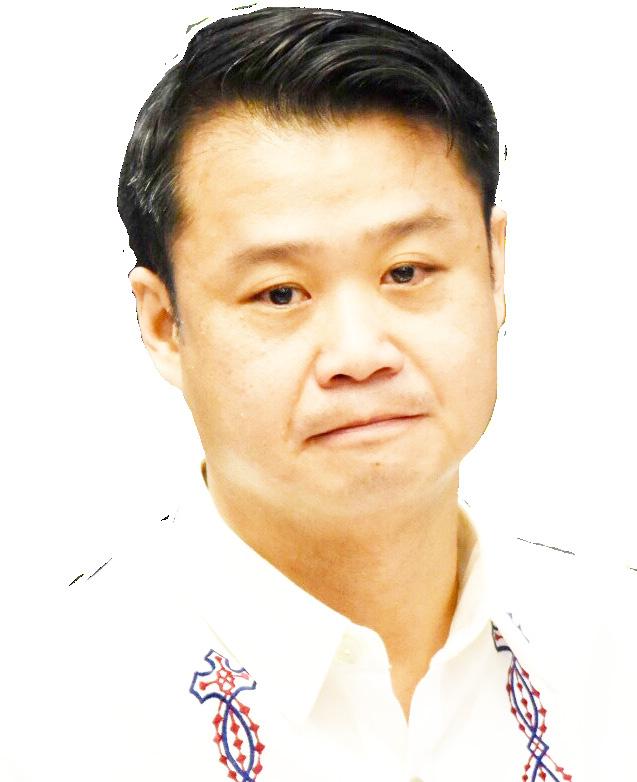
12 minute read
Gatchalian to push teacher salary hike 2
from The Observer.com
by GERRY ROMAN
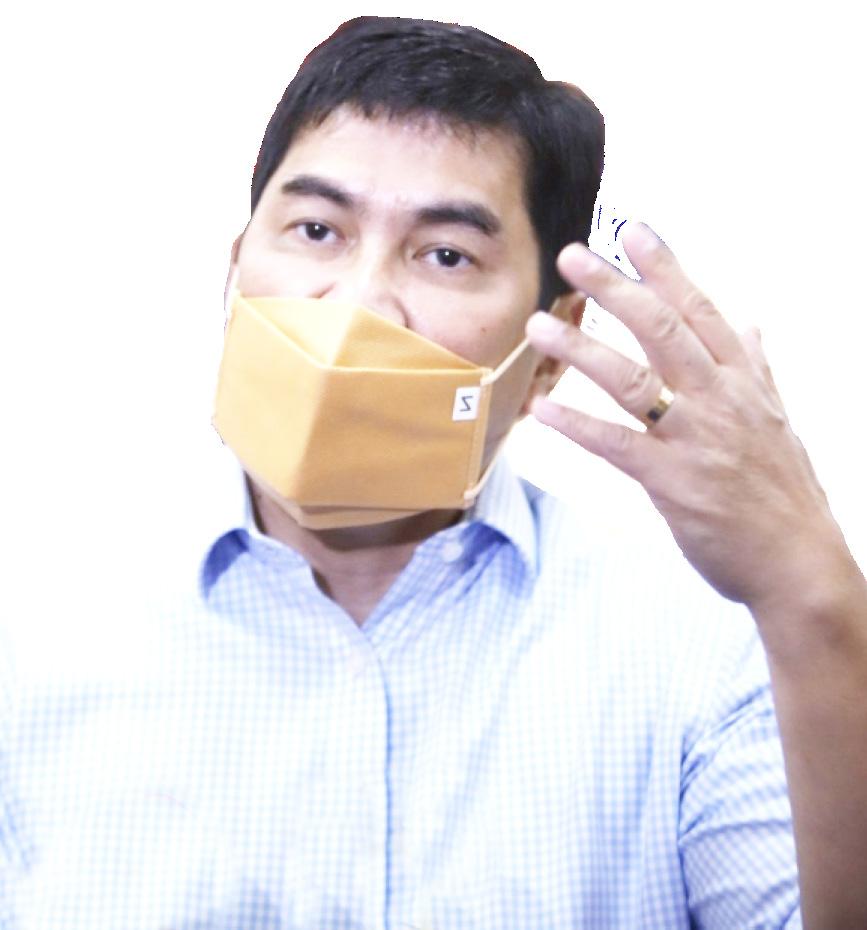
Senator Win Gatchalian
Advertisement
Gatchalian to push teacher salary hike
RESULTS of a survey reveal that half of Filipinos think public school teachers are underpaid. For Senator Win Gatchalian, this puts urgency on passing his topmost priority measure which is to raise the salary of the country’s public school teachers.
Based on the results of a Pulse Asia survey conducted on June 24-27, 50% of respondents think that public school teachers are underpaid, 37% think that they have enough salary, while only 3% say that they are overpaid. Ten percent of respondents cannot say whether teachers are underpaid, overpaid, or have enough salary. The survey, which Gatchalian commissioned, had 1,200 respondents.
More than half of those belonging to Classes ABC (57%) and E (53%) think that public school teachers are underpaid. Almost half (48%) of those in Class D also think that public school teachers are not adequately paid.
Gatchalian has also been pointing out that when it comes to entry level pay, Filipino public school teachers are being left behind by their counterparts in the ASEAN region. In Indonesia for example, the entry-level pay of teachers is P66,099 compared to the P25,439 entry-level pay of Filipino teachers.
In Senate Bill No. 149 or the proposed Teacher Salary Increase Act, Gatchalian proposes to raise the Salary Grades of Teacher I from Salary Grade 11 (P25,439) to Salary Grade 13 (P29,798), Teacher II from SG 12 (P27,608) to SG 14 (P32,321), and Teacher III from SG 13 (P29,798) to SG 15 (P35,097). Raising the salaries of public school teachers was one of Gatchalian’s campaign promises.
“Panahon na upang itaas natin ang sweldo ng ating mga guro, lalo na’t sila ay napakahalagang sangkap sa pagkakatuto ng ating mga kabataan. Kung maitataas natin ang kanilang mga sahod, maitataas din natin ang kanilang morale at mahihikayat din natin ang mas maraming mga kabataan na kumuha ng kurso sa pagtuturo,” said Gatchalian, Chairman of the Senate Committee on Basic Education, Arts and Culture.
Gatchalian also plans to seek amendments to the Magna Carta for Public School Teachers to make it more responsive to present-day challenges. (OSWG)
At least 1.3M beneficiaries under 4Ps no longer considered ‘poor’ – DSWD
DSWD Sec. Erwin Tulfo
MANILA -- The Department of Social Welfare and Development (DSWD) is validating the list of 1.3 million beneficiaries from the Pantawid Pamilyang Pilipino Program (4Ps) who are no longer considered “poor”, Press Secretary Trixie Cruz-Angeles said.
Angeles said DSWD Secretary Erwin Tulfo made the report before President Ferdinand Marcos Jr. during the 3rd Cabinet Meeting held in the Aguinaldo Hall in Malacañang Palace.
“Of note is Sec. Erwin Tulfo’s declaration that in the Pantawid Pamilyang Pilipino Program, at least 1.3 million beneficiaries out of 4.4 million are no longer considered ‘poor’ as a qualification for the 4Ps benefits,” Angeles said.
“This frees up P15B for other qualified persons to replace them and now be included in the 4Ps program,” the Press Secretary added.
The 4Ps is a human development measure of the national government that provides conditional cash grants to the poorest of the poor, to improve the health, nutrition, and the education of children aged 0-18.
It is patterned after the conditional cash transfer (CCT) schemes in Latin American and African countries, which have lifted millions of people around the world from poverty.
The DSWD is the lead government agency of the 4Ps.
The 4Ps also helps the Philippine government fulfill its commitment to the Millennium Development Goals (MDGs)—specifically in eradicating extreme poverty and hunger, in achieving universal primary education, in promoting gender equality, in reducing child mortality, and in improving maternal health care.
The 4Ps operates in all the 17 regions in the Philippines, covering 79 provinces, 143 cities, and 1,484 municipalities. Beneficiaries are selected through the National Household Targeting System for Poverty Reduction (NHTS-PR), which identifies who and where the poor are in the country.
During the Cabinet meeting, the Department of Education (DepEd) discussed its Priority Programs and Projects for Basic Education while the DSWD presented its own Programs and Projects for Social Welfare. (OPS)
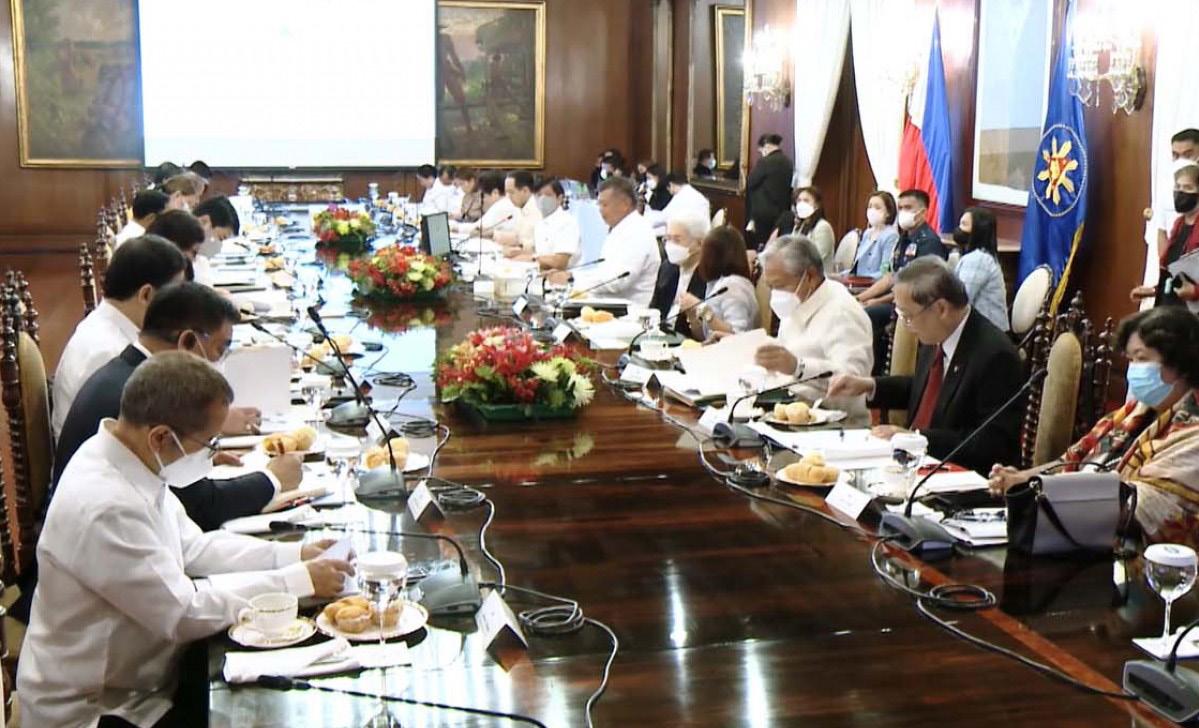
DILG chief seeks upgrade of police investigators’ skills
MANILA – Department of the Interior and Local Government (DILG) Secretary Benjamin Abalos Jr. on Thursday cited the need to enhance the skills of police investigators to ensure the conviction of culprits in criminal cases.
In a press briefing at Camp Crame, Abalos said this is part of the efforts to professionalize the police force.
“It is important that our police investigators are well versed in criminal law. Each criminal act has its own elements and for that, each one of the investigators knows these elements very well,” he added.
He said enhancing the police’s investigation expertise is important as this would determine the fate of a case.
“This single act will determine whether or not the case would be dismissed or not. When it reaches the court, remember, the evidence that is needed in criminal law is proof beyond reasonable doubt,” he added.
Abalos said he will order a review of the procedure for picking police investigators.
“We will have to review ano ba at papaano ba kinukuha ang mga imbestigador sa kapulisyahan (what is being done and how these
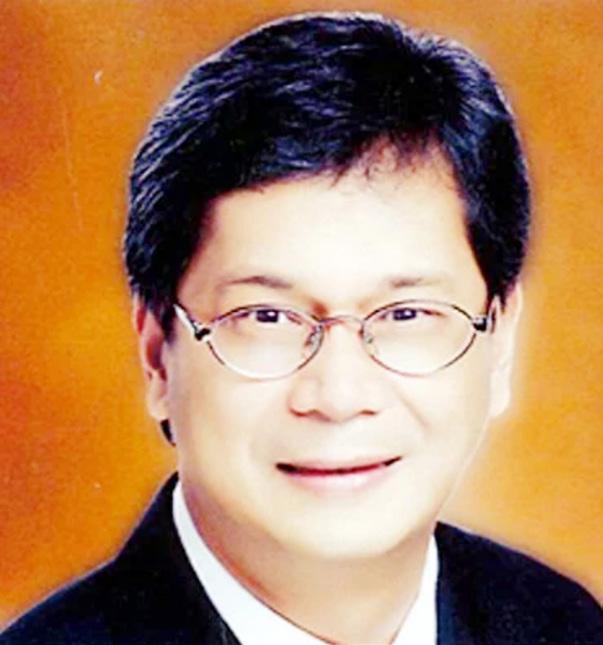
DILG Sec. Benhur Abalos Jr.
investigators are picked). Ito ba ay volunteer system? Ito ba ay may examination? Kaya ba nila o hindi? (Is this via a volunteer system? Is there an examination for this? Are they able to deliver?,” he added.
Based on the latest data, Abalos said the 220,000-strong force has only 22,774 investigators, with only 123 of whom are law graduates.
He added that the DILG, PNP and the Department of Justice (DOJ) are partnering for a “sort of a mentorship” for police investigators to help them gather lawful and foolproof evidence in cases.
“Remember, we are doing this as the people must have trust in the systems of government. And for this trust to be reinforced, the cases that are filed must result in convictions,” he said in a mix of English and Filipino.
From 2016 to July 15, 2022, he said a total of 291,393 drug-related complaints were filed by the PNP.
Of these cases, around 21 percent or 62,000 cases resulted in convictions, 5,551 cases were dismissed by prosecutors while 5,753 cases were dismissed in court.
“Some 223,579 cases or about 77 percent are still pending. Dapat mabantayan ito (We should keep a close watch on these cases),” he said.
Meanwhile, PNP officer-in-charge Lt. Gen. Vicente Danao Jr. thanked the DILG and DOJ for their continued support for the institution.
He said the program will promote a better working relationship between law enforcement agencies.
“This intends to bring together professionals to increase cooperation and unity in our effort on the counter-terrorism and anti-criminality to include information sharing in all agencies. We always instill in every PNP personnel to protect, respect, and fulfill the rights of every citizen and this is significant advocacy of the PNP’s goal towards genuine transformation,” he said. (PNA)
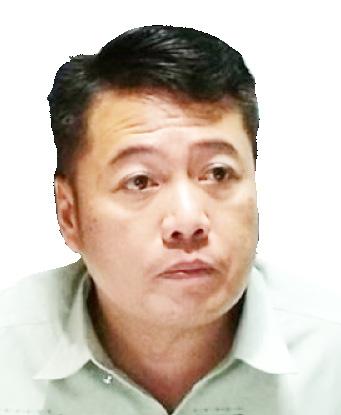
BOC Chief Yogi Filemon Ruiz
Marcos appoints ex-PDEA official as BOC chief
PRESIDENT Ferdinand “Bongbong” Marcos Jr. has appointed Yogi Filemon Ruiz, former Philippine Drug Enforcement Agency (PDEA) official as the new chief of the Bureau of Customs (BOC).
Taking the place former Customs chief Rey Leonardo Guerrero, took his oath of office before the President on Wednesday, July 20, Press Secretary Rose Beatrix “Trixie” Cruz-Angeles said.
Prior to his new appointment, Ruiz served as chief of the BOC’s Enforcement and Security Services in 2017 by his former boss at PDEA, then-Customs commissioner Isidro Lapeña.
He previously served as regional director of the PDEA in Central Visayas.
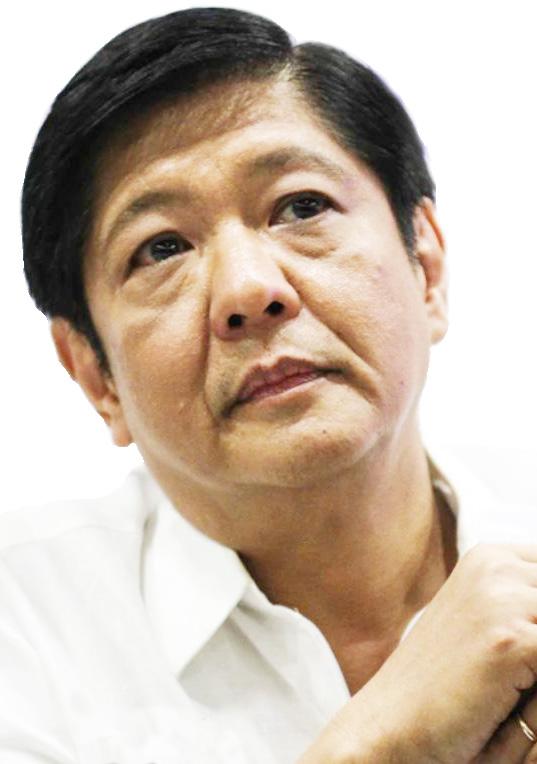

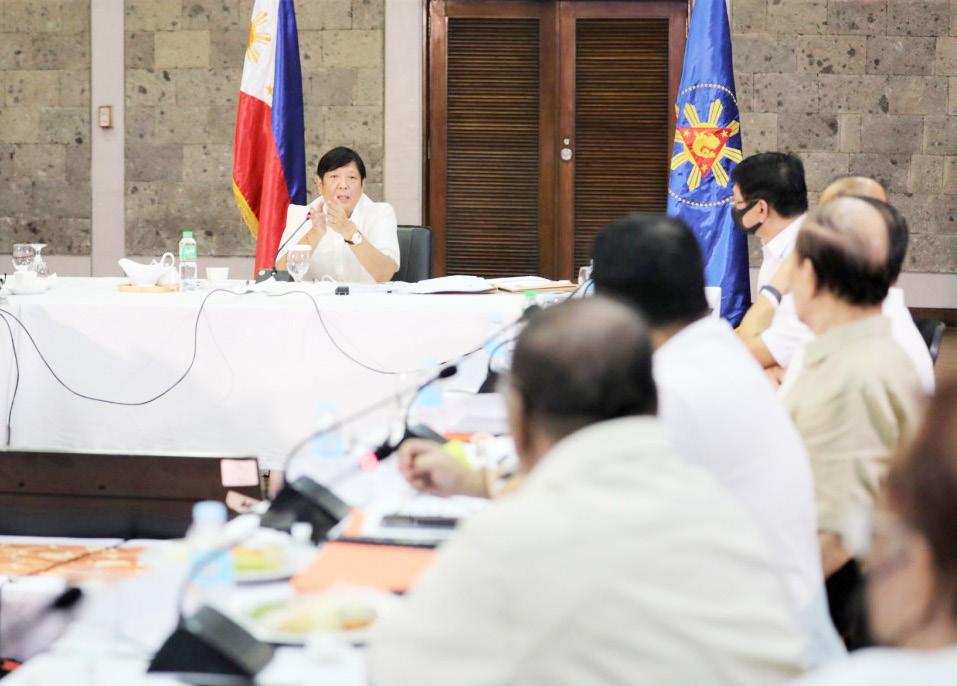
President Ferdinand “Bongbong” Marcos, Jr.
Intensify preps, planning for in-person classes
PRESIDENT Ferdinand Marcos Jr. on Tuesday instructed the Department of Education (DepEd) and other relevant agencies to come up with the necessary preparations and planning for the opening of face-to-face classes this year.
The order was designed to address issues that might arise relative to the return to school of millions of students around the country for the coming school year 2022-2023.
In a Cabinet meeting in Malacañang, Marcos asked Vice President and Education Secretary Sara Duterte on plans by DepEd to address several challenges such as the availability of classrooms, teachers, and other concerns.
“Ang gawin na lang natin [ay] i-identify saan ‘yung areas na magbe-blended learning para maka-focus tayo. Ihanda ‘yung mga devices at mga kailangan nila na noong pandemic hindi nasu-supply-an sa mga bata,” Marcos said.
“We continue with blended learning pero in very specific places lamang. As much as possible, faceto-face na talaga,” the chief executive added.
This came after the issue on whether DepEd should do away with blended learning beyond Oct. 31 was raised during the meeting, considering the challenges that the department is facing.
Based on the recent DepEd order, blended learning shall no longer be implemented beyond Oct. 31, as the department adopts a policy seeking the full implementation of the five- day in-person classes.
Other issues mentioned by the President include internet connectivity and the increasing number of COVID-19 cases in the country, which is driven by the emergence of new variants of the coronavirus.
He was concerned that those issues might affect the implementation of in-person learning, but was he was nevertheless determined to proceed with the plan.
ANG PANGARAP NYO, AY PANGARAP KO...
PBBM appraises DA operational plans to boost food supply
IN an effort to ensure sufficient food supply while the country faces the looming food crisis, and boost production of the country’s essential food items for the long-term, President Ferdinand R. Marcos met with key officials of the Department of Agriculture at the Bureau of Soils and Water Management Convention Hall in Quezon City.
“We need an immediate plan to ensure that our food supply and the food prices are within reach of ordinary Filipinos from now until the end of the year,” the President and current DA Secretary said.
Undersecretary for Operations and Chief-of-Staff Leocadio Sebastian led the presentation of the agency’s catch-up operational plan, which will prioritize the production of rice, corn, livestock, poultry, vegetables, and fisheries will be prioritized.
Strategies for other programs such as fertilizer subsidy, urban and peri-urban agriculture, and Kadiwa that will boost food production and improve the mobilization of affordable agri-fishery commodities were also presented.
To address the high price of fertilizers, President Marcos expressed that government-to-government procurement needs to be pursued to avail of cheaper fertilizers that can be provided to local farmers.
On the issue of vegetable smuggling and illegal importation of other agriculture products, the President also directed that the country’s system of importation should be fixed in coordination with the Bureau of Customs, the House of Representatives, and the Senate.
The country’s Farm-to-Market Road (FMR) Network Plan and the need to prioritize and harmonize FMR projects were also tackled during the meeting.
“FMR is the first step to solve some of the supply chain problem,” the President said.
He stressed that the construction of FMRs and infrastructure support projects should be prioritized in major food production areas and that all FMRs should be aligned with the overall plan.
“We are in the process of maximizing those areas that are already producing para dumami ang production,” the President said.
He also instructed the concerned officials to identify priority areas, create the necessary maps, and provide copies of the master plan to economic managers and local government units.
“Prayoridad sa ating plano para sa agrikultura ay ang pagpapatibay ng programang ‘farm-to-market road’ at pagsusulong ng mga proyektong makakatulong sa ating mga kababayan sa sektor ng agrikultura. Titiyakin natin na may sapat at abot-kayang pagkain para sa lahat,” President Marcos stated in official social media posts.
PBBM vows better support for PH athletes
PRESIDENT Ferdinand “Bongbong” Marcos Jr. has promised to step up government support for national athletes in honing their potentials, as he congratulated the Philippine Women’s National Football team Filipinas for its historic win over weekend.
“We have to do better in terms of government support when it comes to our athletes. Medyo nabawasan nung nawala ‘yung sports sa eskuwelahan, when DECS (Department of Education, Culture and Sports) became Department of Education alone, the emphasis on sport became a little bit less,” President Marcos said during the team’s courtesy call in Malacañang on Wednesday.
“But that is something that we really should encourage because sport means more than just playing games. It means developing discipline, learning how to sacrifice, learning to be gracious in victory, learning to work with other people as a team,” he added.
In congratulating the members of team Filipinas, Marcos said their feat brought so much joy to their countrymen and made them proud of being Filipino.
The win, he added, “is the greatest gift that you have given your country.”
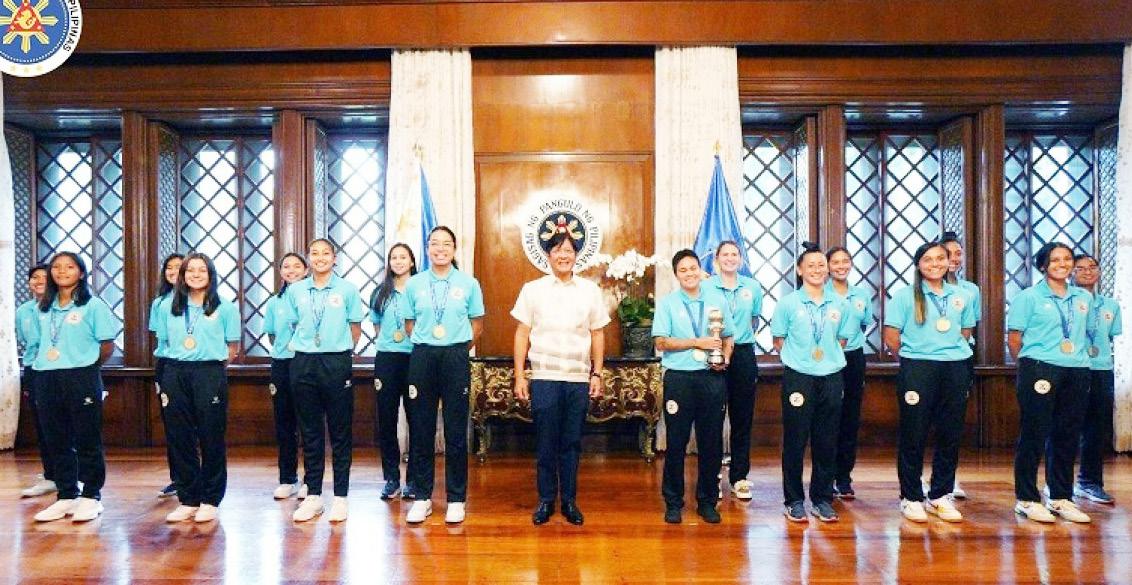
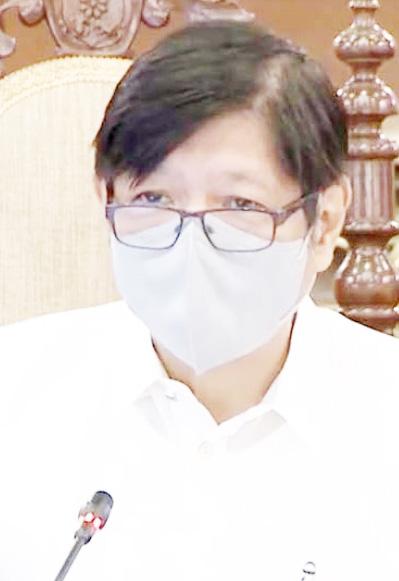
PBBM wants farm-to-market road masterplan to promote food security
PRESIDENT Ferdinand “Bongbong” Marcos Jr. wants the Department of Agriculture (DA) to come up with a farm-to-market road (FMR) masterplan that will serve as a guide for the government in its bid to promote food security and empower rural communities.
Marcos, who concurrently heads the DA, told agriculture officials that the masterplan should include regional maps detailing the exact locations of the farm-to-market roads to be constructed.
The masterplan must be studied thoroughly by the department and must be presented to the country’s economic managers, stressed Marcos.
“Kung sabihin nila saan ba ang areas na talagang kailangan nating buksan? We will go to Public Works. And also, what are the areas that we really want to open, that really need the FMR? Iyon ang unahin natin,” he said.
The plan should also include funding source, payment terms, as well as the time frame for project completion, he added.
The President also wants official development assistance-funded (ODA) projects to be constructed in priority areas identified by the government.
For state-funded FMR projects, he insisted that the DA and the Department of Public Works and Highways (DPWH) should take charge of the implementation.
The President also pointed out that the government must prioritize areas with active agricultural production to address supply chain concerns.
“FMR is the first step to solve some of the supply chain problem. So unahin muna natin ‘yung nagpo-produce,” he said.


